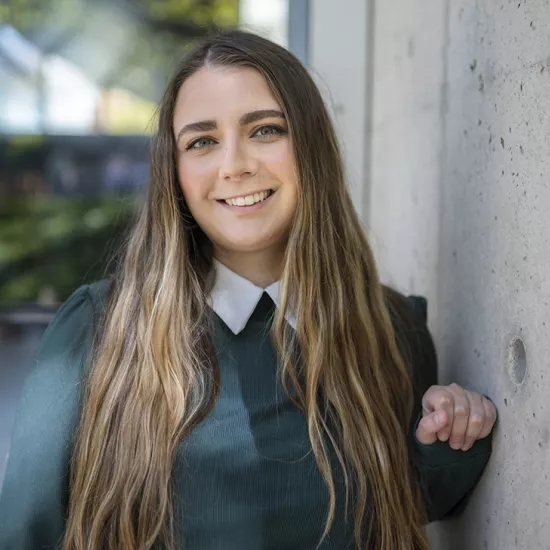Students from UTM’s first spoken word course take the mic for live performance

It’s an “empowering art form,” poet and UTM lecturer Andrea Thompson says of spoken word.
The oral poetic performance art was offered to students at UTM for the first time this past semester. They capped off the coursework by performing in a showcase at the MiST Theatre on April 11.
Earlier in the semester, Thompson said she was excited to see the performances after seeing what students have learned throughout the term.
“This is a transformational course,” Thompson says. “The goal is to create a transformative experience that changes students’ lives.”
Thompson recently published her spoken word album, The Good Word. She taught a spoken word class at U of T’s School of Continuing Studies years prior. But this third-year course, under the umbrella of Special Topics in Creative Writing, is the first credit course offered at the Mississauga campus.
It was met with enthusiasm, Thompson says.
“There aren’t a lot of spoken word courses being taught [anywhere] as credit courses,” she says. “I was really excited about this, and so were the students.”
One of those students, Sumyia Hashmi, says the course has enhanced her writing and poetry skills.
“I hope it’s a recurring course at the university,” she says.
A fourth-year student studying English with a minor in Creative Writing, Hashmi has been writing short stories and prose since the ninth grade. It wasn’t until she came to UTM that her interest in poetry grew. After taking a series of courses at UTM on poetry and literature, including Thompson’s spoken word class, Hashmi says she’s “come out of her shell.”
The course taught her not just how to write poetry and recite it, but also public speaking skills, collaboration with other students, develop critical thinking, organize ideas and articulate them.
Hashmi adds the collaborative aspect of the course was “one of my favourite parts about the class.”
The course structure isn’t your typical lecture. Instead, Thompson gives her students weekly assignments and writing prompts. Students then learn, write, and share in interactive open discussions before they perform their poetry.
“A lot of us were nervous at first,” Hashmi says. But after hearing Thompson’s spoken word, followed by prompts, discussions, and some performances, students became more and more comfortable with the art form.
A spoken word performance involves much more than reading words on a page, Thompson says. There is a performative, dramatic element that involves body language, word choice, pauses, breaks, gestures, and more, while reciting the poem.
“You want to use everything in your physicality [when performing],” she says. “You use stance breaks, line breaks, word choice — all these tools. Your voice is the number one tool to take what’s in your head and heart and on the page and make that come alive.”
Related coverage:



